
Risk Hazards & Crisis in Public Policy
Scope & Guideline
Exploring the intersection of risk and policy innovation.
Introduction
Aims and Scopes
- Risk Management Strategies:
Explores various strategies and frameworks for managing risks associated with natural disasters, health emergencies, and technological hazards, providing insights into best practices and policy implications. - Crisis Communication and Public Perception:
Investigates the dynamics of crisis communication, including the role of media, public perception, and trust in authorities during crises, with a goal of improving communication strategies. - Social Vulnerability and Resilience:
Focuses on understanding the social dimensions of vulnerability and resilience in the face of disasters, examining how social equity impacts crisis outcomes and policy effectiveness. - Governance and Policy Analysis:
Analyzes the governance structures and policy responses to crises, including the role of local, national, and international actors in disaster management and risk regulation. - Innovations in Emergency Management:
Highlights innovative practices and technologies in emergency management, including the use of social media and crowdsourcing for crisis response and community engagement.
Trending and Emerging
- Impact of COVID-19 on Crisis Management:
A significant number of recent publications focus on the lessons learned from the COVID-19 pandemic, examining its impact on crisis management strategies and public health policies, which is critical for future preparedness. - Role of Social Media and Crowdsourcing:
Emerging research increasingly emphasizes the role of social media and crowdsourcing in disaster response, exploring how these tools can enhance community engagement and information dissemination during crises. - Equity and Social Justice in Disaster Response:
There is a growing focus on social equity and justice in disaster management, reflecting an awareness of how marginalization affects vulnerability and resilience, which is essential for developing inclusive policies. - Interdisciplinary Approaches to Risk Management:
The journal is trending towards interdisciplinary research that integrates insights from various fields, such as sociology, psychology, and environmental science, to better understand and address complex crises. - Misinformation and Public Trust:
Recent publications are increasingly addressing the challenges posed by misinformation during crises and its effects on public trust, highlighting the importance of effective communication strategies in managing perceptions.
Declining or Waning
- Historical Perspectives on Crisis Management:
Research focusing on historical analyses of past crises and their management has decreased, possibly due to a shift towards more contemporary and immediate concerns in crisis response. - Technical and Engineering Approaches to Disaster Management:
There has been a noticeable reduction in publications emphasizing purely technical or engineering solutions to disaster management, suggesting a move towards more integrative and interdisciplinary approaches. - Quantitative Risk Assessment Models:
The frequency of studies employing traditional quantitative risk assessment models has diminished, indicating a potential shift towards qualitative analyses and case studies that explore complex social dynamics.
Similar Journals
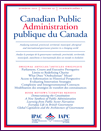
CANADIAN PUBLIC ADMINISTRATION-ADMINISTRATION PUBLIQUE DU CANADA
Unpacking the Essentials of Public GovernanceCanadian Public Administration - Administration Publique du Canada, an esteemed journal published by Wiley, has been a cornerstone in the field of public administration since its inception in 1958. With an ISSN of 0008-4840 and an E-ISSN of 1754-7121, this journal explores critical issues in public governance, policy analysis, and administrative theory, attracting contributions from leading scholars and practitioners alike. It boasts a notable Standing in both the Q2 Quartile of Public Administration and Sociology & Political Science categories, signifying its significant influence within academic circles, as evidenced by its Scopus rankings. The journal does not currently offer Open Access, allowing for curated and in-depth scholarly debate and analysis. Addressing diverse topics relevant to public policy and administration, it serves as an indispensable resource for researchers, professionals, and students seeking to deepen their understanding of effective governance and organizational dynamics in a public sector context. As it approaches its convergence of years extending to 2024, Canadian Public Administration remains vital in shaping contemporary discourse on administrative practices in Canada and beyond.
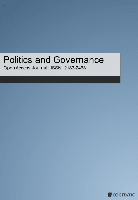
Politics and Governance
Championing Open Access Research in Politics and GovernancePolitics and Governance is an esteemed academic journal published by COGITATIO PRESS, focusing on critical discourse in the field of public administration, sociology, and political science. Since its inception in 2013, this open-access journal has established itself as a vital platform for innovative research and discourse, currently enjoying a commendable Q2 ranking in Public Administration and a prestigious Q1 ranking in Sociology and Political Science as of 2023. With an impressive Scopus ranking, placing it in the 86th and 74th percentiles for sociology and public administration respectively, Politics and Governance aims to disseminate quality scholarly articles that contribute to the understanding of political dynamics and governance structures. Through its commitment to open access, the journal ensures that valuable research is accessible to a global audience, fostering a diverse academic dialogue that is essential for evolving the field. Based in Lisbon, Portugal, the journal serves as a crucial resource for researchers, professionals, and students striving to engage meaningfully with contemporary issues in governance and policy.
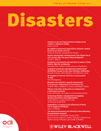
DISASTERS
Advancing interdisciplinary insights into disaster management.DISASTERS, published by WILEY, is a premier academic journal dedicated to advancing the understanding of disasters across multiple disciplines, including Earth and Planetary Sciences and Social Sciences. With a historical publication span from 1977 to 2024, this journal has established itself as a vital resource within the academic community, boasting a Q1 category ranking in both fields, indicating its high impact and relevance. DISASTERS ranks impressively in Scopus, holding the #27 position in General Social Sciences and #36 in General Earth and Planetary Sciences, reflecting its influence in shaping disaster research and policy. The journal serves as a platform for interdisciplinary collaboration, offering researchers, professionals, and students critical insights into disaster management, response strategies, and risk reduction measures. Although it is not an Open Access journal, DISASTERS remains a cornerstone for those looking to contribute to and stay informed about the evolving landscape of disaster studies.
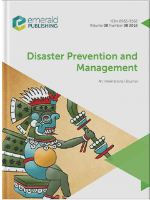
Disaster Prevention and Management
Advancing resilience through research and innovation.Disaster Prevention and Management, published by Emerald Group Publishing Ltd, is a leading journal in the fields of disaster management, public health, and environmental policy. With an ISSN of 0965-3562 and an E-ISSN of 1758-6100, this journal has made significant contributions to both theoretical and practical advancements since its inception in 1992. Operating from the United Kingdom, it holds a Q2 ranking across various categories, including Business, Management and Accounting, Health (Social Science), and Public Health, reflecting its pivotal role in academic discourse and policy formulation. By engaging with contemporary issues related to disaster risk reduction, emergency preparedness, and resilience strategies, Disaster Prevention and Management aims to foster a multidisciplinary approach, making it a vital resource for researchers, practitioners, and students seeking to navigate the complexities of disaster scenarios effectively. With an impressive Scopus ranking across multiple categories, researchers are encouraged to explore its diverse range of articles and reports available for their academic and professional endeavors.

Geoenvironmental Disasters
Connecting disciplines to tackle geoenvironmental risks.Geoenvironmental Disasters, published by SPRINGERNATURE, is a leading open-access journal dedicated to advancing the interdisciplinary fields of environmental science, geography, and geotechnical engineering. Since its inception in 2014, the journal has made significant strides in disseminating high-quality research that addresses the challenges posed by geoenvironmental hazards and their impacts on society. With an impressive Q1 ranking across multiple categories, including Environmental Science (miscellaneous) and Geography, Planning and Development, it occupies a vital niche within the academic community. The journal’s rigorous peer-review process ensures that only the most insightful contributions are made available to a global audience. Researchers, professionals, and students are encouraged to engage with the content, which covers a wide range of topics, including disaster management, risk assessment, and stakeholder engagement in policy-making. This commitment to open-access accessibility since 2014 further enhances its reach and impact, providing a critical platform for advancing knowledge and innovation in managing geoenvironmental disasters.
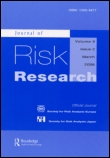
JOURNAL OF RISK RESEARCH
Unraveling the Intricacies of Risk in Real-World ApplicationsJOURNAL OF RISK RESEARCH, published by Routledge Journals, Taylor & Francis Ltd, is a prestigious academic journal dedicated to advancing the understanding of risk across diverse fields, including engineering, safety, social sciences, and management. With its impact reflected in its Q1 quartile rankings in multiple categories and a solid standing in Scopus rankings, this journal serves as an essential resource for researchers, professionals, and students aiming to explore the complexities of risk analysis and its implications in real-world scenarios. The journal has been consistently publishing high-quality research since 1998, contributing to both theoretical frameworks and practical applications. While not open access, the content of the journal is invaluable for those keen on staying at the forefront of risk research. By addressing the multifaceted nature of risk, including safety, reliability, and strategic management, the JOURNAL OF RISK RESEARCH plays a vital role in shaping contemporary discussions and innovations in risk management and decision-making.

Australian Journal of Emergency Management
Elevating standards in public health and safety.The Australian Journal of Emergency Management, published by the Australian Emergency Management Institute, is a pivotal resource in the field of emergency management, public health, and safety research. With a history dating back to 1998 and a convergence period extending to 2024, this journal actively contributes to advancing knowledge and practice in emergency medical services and related areas. Holding strong positions in both the Q2 and Q3 quartiles of 2023 rankings, it stands out within its categories, particularly in Health Professions and Safety Research. While it is not an open-access journal, it provides essential insights and empirical research that are invaluable for researchers, professionals, and students alike. Located in East Melbourne, Australia, the journal ensures that critical advancements in emergency management and health are highly accessible to its global audience, fulfilling its mission to promote informed decision-making and improve community resilience during crises.
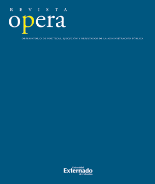
Opera-Colombia
Fostering Innovation in the World of OperaOpera-Colombia is a distinguished academic journal published by UNIV EXTERNADO COLOMBIA, DEPT PUBLICACIONES, that has been serving the scholarly community since its inception in 2001 as an Open Access platform. With its ISSN 1657-8651 and E-ISSN 2346-2159, the journal stands out as a vital resource for researchers, professionals, and students in the fields of performing arts, musicology, and cultural studies. Based in Bogotá, Colombia, it aims to foster the dissemination of innovative research and critical discourse within the sphere of Colombian opera and beyond. As a journal committed to accessibility, it ensures that its wide-ranging articles are freely available to promote knowledge and engagement worldwide, reinforcing its importance in the contemporary academic landscape.
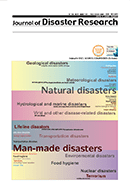
Journal of Disaster Research
Advancing resilience through innovative disaster research.Journal of Disaster Research, published by FUJI TECHNOLOGY PRESS LTD, is a prominent Open Access journal that has been disseminating critical research on disaster management since its inception in 2007. Focusing on the interrelated fields of engineering and safety, the journal aims to advance knowledge and policy in disaster risk reduction, response, and resilience, making it an essential resource for researchers, practitioners, and policymakers alike. With an ISSN of 1881-2473 and E-ISSN 1883-8030, the journal covers a wide range of topics related to disaster studies, ensuring the dissemination of innovative solutions and diverse perspectives. Situated in Japan, the journal has been ranked Q3 in both Engineering (Miscellaneous) and Safety, Risk, Reliability, and Quality categories, showcasing its commitment to quality scholarship. As it converges its research contributions from 2006 to 2024, the Journal of Disaster Research continues to serve as a vital platform for advancing the science and practice of disaster research, thereby enhancing societal resilience against crises.
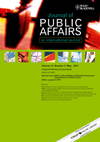
Journal of Public Affairs
Championing Inclusivity in Public Affairs ScholarshipThe Journal of Public Affairs, published by WILEY, is a prestigious academic forum dedicated to the study of public administration, political science, and international relations. With its ISSN 1472-3891 and E-ISSN 1479-1854, this journal has established itself as a crucial resource in the field, reflected in its impressive Scopus rankings, placing it in the top 4% of journals in Political Science and the top 12% in Public Administration. As part of its commitment to fostering innovative research, the journal has maintained a commitment to inclusivity in scholarship from its inception in 2008 and continues to be a significant platform for discourse up to 2024. With an impact factor that underscores its relevance and authority, the Journal of Public Affairs targets an audience of researchers, policymakers, and students eager to explore critical issues shaping governance and public policy. This journal serves as a vital repository of knowledge, aiming to not only disseminate scholarly work but also to bridge theoretical insights with practical applications in the public sector.